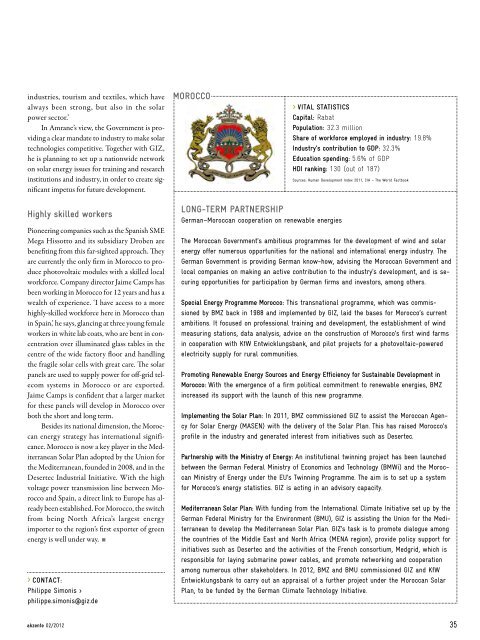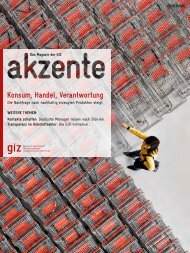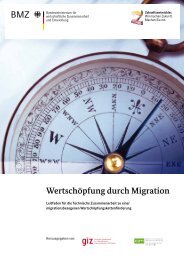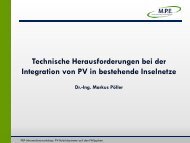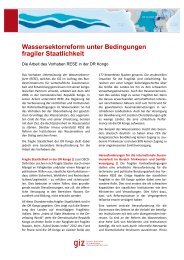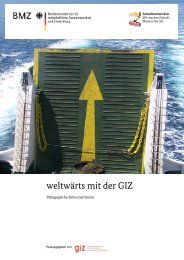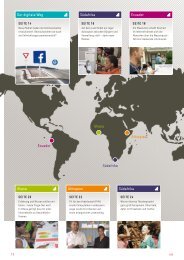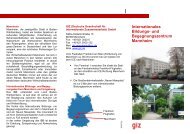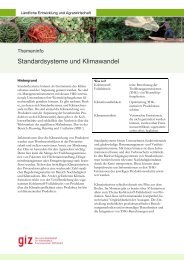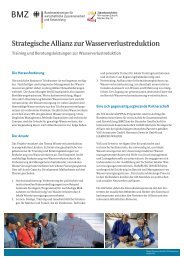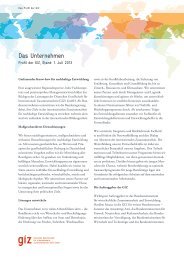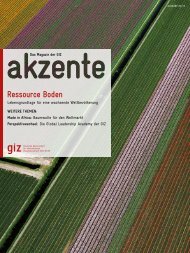Complete issue (pdf, 12.56 MB, EN) - GIZ
Complete issue (pdf, 12.56 MB, EN) - GIZ
Complete issue (pdf, 12.56 MB, EN) - GIZ
You also want an ePaper? Increase the reach of your titles
YUMPU automatically turns print PDFs into web optimized ePapers that Google loves.
industries, tourism and textiles, which have<br />
always been strong, but also in the solar<br />
power sector.’<br />
In Amrane’s view, the Government is providing<br />
a clear mandate to industry to make solar<br />
technologies competitive. Together with <strong>GIZ</strong>,<br />
he is planning to set up a nationwide network<br />
on solar energy <strong>issue</strong>s for training and research<br />
institutions and industry, in order to create significant<br />
impetus for future development.<br />
Morocco<br />
> Vital Statistics<br />
Capital: Rabat<br />
Population: 32.3 million<br />
Share of workforce employed in industry: 19.8%<br />
Industry’s contribution to GDP: 32.3%<br />
Education spending: 5.6% of GDP<br />
HDI ranking: 130 (out of 187)<br />
Sources: Human Development Index 2011, CIA – The World Factbook<br />
Highly skilled workers<br />
Pioneering companies such as the Spanish SME<br />
Mega Hissotto and its subsidiary Droben are<br />
benefiting from this far-sighted approach. They<br />
are currently the only firm in Morocco to produce<br />
photovoltaic modules with a skilled local<br />
workforce. Company director Jaime Camps has<br />
been working in Morocco for 12 years and has a<br />
wealth of experience. ‘I have access to a more<br />
highly-skilled workforce here in Morocco than<br />
in Spain,’ he says, glancing at three young female<br />
workers in white lab coats, who are bent in concentration<br />
over illuminated glass tables in the<br />
centre of the wide factory floor and handling<br />
the fragile solar cells with great care. The solar<br />
panels are used to supply power for off-grid telecom<br />
systems in Morocco or are exported.<br />
Jaime Camps is confident that a larger market<br />
for these panels will develop in Morocco over<br />
both the short and long term.<br />
Besides its national dimension, the Moroccan<br />
energy strategy has international significance.<br />
Morocco is now a key player in the Mediterranean<br />
Solar Plan adopted by the Union for<br />
the Mediterranean, founded in 2008, and in the<br />
Desertec Industrial Initiative. With the high<br />
voltage power transmission line between Morocco<br />
and Spain, a direct link to Europe has already<br />
been established. For Morocco, the switch<br />
from being North Africa’s largest energy<br />
import er to the region’s first exporter of green<br />
energy is well under way.<br />
> Contact:<br />
Philippe Simonis ><br />
philippe.simonis@giz.de<br />
akzente 02/2012<br />
Long-term partnership<br />
German–Moroccan cooperation on renewable energies<br />
The Moroccan Government’s ambitious programmes for the development of wind and solar<br />
energy offer numerous opportunities for the national and international energy industry. The<br />
German Government is providing German know-how, advising the Moroccan Government and<br />
local companies on making an active contribution to the industry’s development, and is securing<br />
opportunities for participation by German firms and investors, among others.<br />
Special Energy Programme Morocco: This transnational programme, which was commissioned<br />
by BMZ back in 1988 and implemented by <strong>GIZ</strong>, laid the bases for Morocco’s current<br />
ambitions. It focused on professional training and development, the establishment of wind<br />
measuring stations, data analysis, advice on the construction of Morocco’s first wind farms<br />
in cooperation with KfW Entwicklungsbank, and pilot projects for a photovoltaic-powered<br />
electricity supply for rural communities.<br />
Promoting Renewable Energy Sources and Energy Efficiency for Sustainable Development in<br />
Morocco: With the emergence of a firm political commitment to renewable energies, BMZ<br />
increased its support with the launch of this new programme.<br />
Implementing the Solar Plan: In 2011, BMZ commissioned <strong>GIZ</strong> to assist the Moroccan Agency<br />
for Solar Energy (MAS<strong>EN</strong>) with the delivery of the Solar Plan. This has raised Morocco’s<br />
profile in the industry and generated interest from initiatives such as Desertec.<br />
Partnership with the Ministry of Energy: An institutional twinning project has been launched<br />
between the German Federal Ministry of Economics and Technology (BMWi) and the Moroccan<br />
Ministry of Energy under the EU’s Twinning Programme. The aim is to set up a system<br />
for Morocco’s energy statistics. <strong>GIZ</strong> is acting in an advisory capacity.<br />
Mediterranean Solar Plan: With funding from the International Climate Initiative set up by the<br />
German Federal Ministry for the Environment (BMU), <strong>GIZ</strong> is assisting the Union for the Mediterranean<br />
to develop the Mediterranean Solar Plan. <strong>GIZ</strong>’s task is to promote dialogue among<br />
the countries of the Middle East and North Africa (M<strong>EN</strong>A region), provide policy support for<br />
initiatives such as Desertec and the activities of the French consortium, Medgrid, which is<br />
responsible for laying submarine power cables, and promote networking and cooperation<br />
among numerous other stakeholders. In 2012, BMZ and BMU commissioned <strong>GIZ</strong> and KfW<br />
Entwicklungsbank to carry out an appraisal of a further project under the Moroccan Solar<br />
Plan, to be funded by the German Climate Technology Initiative.<br />
35


